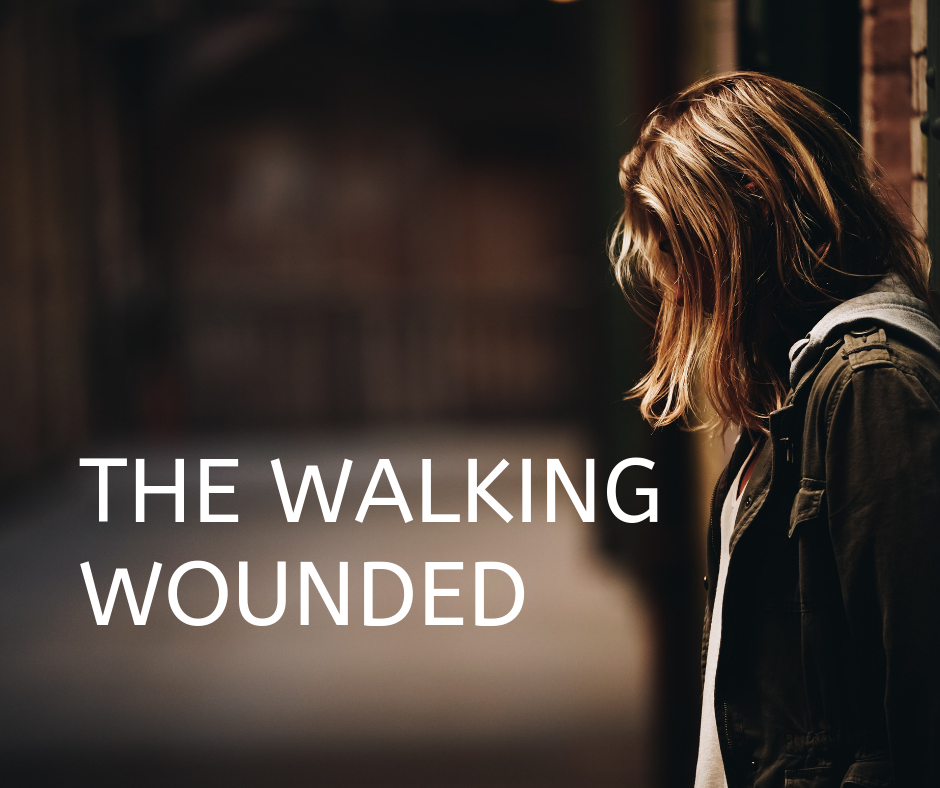
“One foot in front of the other. That’s it. Just keep going.” I’m mentally coaxing myself.
Numb. Dazed. The walking wounded.
“Please don’t bump me,” I’m silently pleading with the strangers who I pass in the supermarket as the bruises on my arms and shoulders throb with a reminder of this morning’s events. My head is down and my hair is intentionally arranged to shield my eyes from the stares that I am certain are on me. How could anyone not stare? I’m a dreadful mess. I’m wounded.
But I have a task to do, and I must get it done.
I’m trying not to make eye contact with my fellow shoppers as I reach for a bag and fill it with apples. I don’t want anyone staring at the damage he left on my face. Just thinking about it makes a tear fall down my cheek, burning my swollen eyes. But I think people are starting to notice. I want to tell them that he didn’t mean to do this. It’s not his fault. Not really. They shouldn’t judge us. They don’t know.
Once the items on my list have been found, purchased, bagged, and toted out to my SUV, I finally find safety in the comfortable solitude of my front seat. I take a deep breath and slowly reach for the mirror. I’ve yet to look at the wounds but I know I should assess the damage before I get home.
Looking at my arms, first, I’m surprised that I don’t see the bruises. How could this be? They ache and they throb from the way he grabbed me and threw me against the wall … the way he pinned me down … the way he whipped me back and forth like a rag doll. Where are the bruises?
I look at my face in the reflection and gasp at the girl staring back at me. She looks sad and distant. Her face is sullen and pale … but not bludgeoned. Where are the tears in her flesh from the blow she took to her cheek? Where is the blood in the corner of her mouth that she spit up when he punched her in her stomach? As I stare at my reflection I can scarcely believe that girl is me. Where are my wounds? How can they not be visible? How is it possible that someone could deliver so massive an assault that there would be no proof of it?
How could such cutting words and ripping accusations not leave a mark? How could that much mental, verbal, and emotional abuse not leave me physically wounded?
I look away from the mirror, unable to fathom the possibility that nobody can see my pain. Angry, I know that he will walk past me all day and see nothing of the damage he caused just moments ago. He won’t know. He won’t see. Nobody will see that I’m the walking wounded.
Desperate, I cry out to God, “How can this be?! How can he go about not knowing what he has done? Why can he not see my wounds? God, do you see them? Do you see me?”
As if God is sending me an audible answer, a little voice from the backseat giggles as her chubby little fists spring from her covered eyes into arms wide open.
“I see you, Mama! Peekaboo, I see you!”
She sees me. The one person I want to spare from the knowledge of my pain is looking at me expectantly, waiting for me to respond in my usual playful and comforting voice.
“I see you, too, baby! Peekaboo!” I say as I wipe my tears, readjusting my mirror and heading the car toward home.
I look up in my mirror one more time, envious of my girl’s ability to be blissfully preoccupied even though an hour ago she watched the absolute worst of her parents’ marriage unfold before her eyes.

“I see you,” I whisper to myself. “I see you. I see your pain, but I also see your love. I see your bruised heart but I also see your strength. I see your defeat but I see your victory.”
I look down at my ring as my left hand slides over the steering wheel.
“I see you,” I whisper to him. “I see your pain, but I also see your love. I see your brute strength but I also see your vulnerable insecurity. I see your anger, but I also see your wounds. I see your PTSD, but I also see your victory. I see our victory. It’s coming. I’m not giving up on you. I’m not giving up on your healing.”
We are the walking wounded.
And we are not alone.
~~~~~~~~~~~~~~~~~~~~
Now fast forward eight years.
The victory came. The healing came. The tears and the struggles and the fights and the pleading and the opening up and the confiding and the surrender. It all came. It continues to come.
March is Brain Injury Awareness Month and I want to make you aware that over the past ten years, around 400,000 service members have been diagnosed with a traumatic brain injury (or TBI). It’s also believed that around 20% of all combat veterans have some degree of post-traumatic stress disorder (or PTSD). While PTSD is classified as a mental illness and not a brain injury, the symptoms are often the same, making it difficult to distinguish between the two. Regardless of what you call it, thousands of military families have been shaken, crumbled, or dissolved because it. Countless marriages have ended. Countless children have been scarred. Countless veterans have taken their own lives because of it. Countless lives are now walking wounded.
My story has a happy ending because I reached out for support; I set boundaries; and I took it upon myself to learn everything I could about my husband’s diagnoses of both TBI and PTSD.
Support, boundaries, and knowledge are the three keys to recovery.
I had no idea what a TBI was when my husband was diagnosed. Truthfully, I didn’t understand PTSD either but there is a plethora of information readily available on both diagnoses. Knowing the symptoms of each, what causes them, and what can trigger them helped me understand the big picture of what we were facing.
They say that knowledge is power but I want to add that boundaries are what keep people from harm.
If someone you love is battling TBI and/or PTSD, it is not your fault but it is up to you to protect yourself and your children. It is up to you to draw those hard lines in the sand.
While your loved one must seek help to heal, you must draw a box around yourself to prevent further harm.
We’re always told that in the event of an airplane emergency, we need to put on our own masks before assisting someone else. The same holds true in a family burdened with TBI and/or PTSD. You must take care of yourself, find safety for yourself, protect yourself before you can help your loved one who is suffering.
This is where support comes in. There is a thin, gray, dotted line between being sympathetic to your spouse’s condition and enabling bad behavior. It’s impossible to navigate that line without help.
When you look at the person you have lovingly and passionately pledged your life to, it is hard to practice tough love. When you see how badly they are hurting and how badly their own wounds are festering, it often feels unbearable to think you are adding more pressure and pain to what they’re already carrying. It’s overwhelming and confusing and scary and emotional. It’s hard to know what is right and what is wrong. It is hard to know what to tolerate and what to extend grace over.
Support is key. You need to surround yourself with professionals who can speak truth to you as well as peers who will lovingly come beside you. Organizations such as Operation Homefront’s Hearts of Valor and the Wounded Warrior Project offer amazing peer groups, retreats, and resources for spouses of wounded warriors. Their resources are invaluable. Friendships I made at a Hearts of Valor Retreat back in the early days of our battle have held me together for nine years and counting. I don’t think I would have survived, healed, or grown without their support.
Many spouses choose not to reach out for help because they don’t want the situation at home to become worse. They don’t want their loved one to become more angry or to feel betrayed. They fear abandonment. They begin to question their own sanity because they’ve been told over and over that every fight they’ve had is their fault. They don’t want a divorce, they just want their spouse to get better. They know they’d never stay if they were ever physically assaulted, but they don’t know whether verbal abuse justifies leaving. The confusion grows along with the pain and there seems to be no solution. Unfortunately, PTSD and TBI do not get better over time if left untreated.
Enduring abuse is not a solution. If you are among the walking wounded, please know that you are not alone, and it is not your fault.
It’s also not your warrior’s fault that he or she is suffering from this invisible injury. This is why the stigma needs to be addressed.
Veterans with PTSD and/or TBI are not all monsters. They are not all beyond hope. They are not all going to beat their spouses, abandon their children, initiate workplace violence, or commit suicide.
Veterans that sink that far down into the pit of depression and illness are a minority, yet as many as 22 a day are taking their own lives.
Their battle is real. Their injuries are invisible. But the effects are life shattering. These warriors need help, not condemnation. They need treatment, not abandonment. That’s what makes living with someone with PTSD and/or TBI so difficult. You recognize the person you love inside the person that is being abusive.
You know the person you married is hurt and scared and the last thing you want is to bring shame and isolation down upon them, yet you can’t stay in an abusive situation.
This is why support is so crucial. Nobody knows how to navigate these treacherous waters on their own. Get yourself help. Get your veteran help.
As I’ve often heard, the actions of someone with PTSD/TBI are “a natural reaction to an unnatural occurrence.” What they are experiencing is normal, given the horrific things they have seen and heard and done. The way they are behaving is “normal.” But it’s not OK. Abuse, of any kind, is never OK.
If you are among the walking wounded, reach out. Become informed. Draw boundaries. Get support. You are worth it.
~~~~~~~~~~~~~~~~~~~~~~~~~~~~~~~
If you are being physically or sexually abused, please get somewhere safe and reach out for help by calling the National Domestic Abuse Hotline at 1-800-799-7233 or another trusted source of help.
If you are the victim of mental, emotional, or verbal abuse at the hands of someone with PTSD, you do not have to suffer in silence. Please reach out to a counselor, your local VA, or military treatment facility.
For confidential non-medical counseling and assistance, call Military OneSource at 1-800-342-9647.











